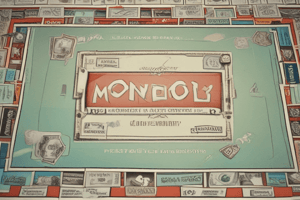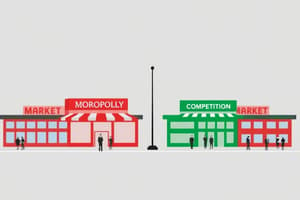Podcast
Questions and Answers
What is the strategic advantage of offering your orange and light blue for your opponent's pink and $400?
What is the strategic advantage of offering your orange and light blue for your opponent's pink and $400?
- It makes your opponent feel confident about their position.
- It helps you build houses on a less valuable property set. (correct)
- It allows your opponent to catch up financially.
- It secures valuable properties for you. (correct)
Which aspect of gameplay is emphasized for advantage over opponents?
Which aspect of gameplay is emphasized for advantage over opponents?
- Controlling the Jail side of the board. (correct)
- Building houses on every property owned.
- Controlling the utility properties.
- Avoiding trades with opponents.
Why is it important to trade strategically?
Why is it important to trade strategically?
- To leave your opponent cash-poor after the trade.
- To manage your finances and control the game's pace. (correct)
- To provide your opponent with future advantages.
- To ensure you win the game outright.
What is a key takeaway regarding house building?
What is a key takeaway regarding house building?
How should you approach discussing trades to appear more favorable to your opponent?
How should you approach discussing trades to appear more favorable to your opponent?
When is the best time to build houses?
When is the best time to build houses?
What is a disadvantage of the trade mentioned in the scenario?
What is a disadvantage of the trade mentioned in the scenario?
Which strategy maximizes the value of acquired properties in Monopoly?
Which strategy maximizes the value of acquired properties in Monopoly?
What is the most favorable number of houses to build on a property set for maximum return?
What is the most favorable number of houses to build on a property set for maximum return?
What should players do to manage their properties effectively during the game?
What should players do to manage their properties effectively during the game?
Why is tracking Chance and Community Chest cards beneficial?
Why is tracking Chance and Community Chest cards beneficial?
When is it most advisable to buy houses according to the house strategy?
When is it most advisable to buy houses according to the house strategy?
What is a primary goal when trading properties in Monopoly?
What is a primary goal when trading properties in Monopoly?
How should players approach acquiring properties at auction?
How should players approach acquiring properties at auction?
What is the significance of the dice roll of seven in Monopoly?
What is the significance of the dice roll of seven in Monopoly?
Flashcards
Monopoly Board Layout
Monopoly Board Layout
The Monopoly board has uneven property distribution, with some areas (hotspots) more desirable than others (coldspots).
Dice Probability
Dice Probability
Rolling a seven is statistically most likely in Monopoly, affecting potential property landings.
Property Acquisition Strategy
Property Acquisition Strategy
Aggressively purchase properties on the 'Jail side' initially, and use auctions to acquire undervalued properties.
Houses vs. Mortgages
Houses vs. Mortgages
Signup and view all the flashcards
House Strategy
House Strategy
Signup and view all the flashcards
Chance/Community Chest
Chance/Community Chest
Signup and view all the flashcards
Trading Strategy
Trading Strategy
Signup and view all the flashcards
Disguised Trade
Disguised Trade
Signup and view all the flashcards
Strategic Trading
Strategic Trading
Signup and view all the flashcards
Financial Advantage
Financial Advantage
Signup and view all the flashcards
House Building
House Building
Signup and view all the flashcards
Opponent Vulnerability
Opponent Vulnerability
Signup and view all the flashcards
Dice Probability
Dice Probability
Signup and view all the flashcards
Jail Strategy
Jail Strategy
Signup and view all the flashcards
Disguised Trade
Disguised Trade
Signup and view all the flashcards
Study Notes
Monopoly Strategy
-
Board Layout:
- The Monopoly board is uneven, with "hot spots" and "cold spots".
- Jail is the most likely spot to land on, making properties after Jail more valuable.
- The "Go To Jail" space reduces the likelihood of landing on properties after it.
- The board can be divided into the "Jail side" and the "Ghost side", with the Jail side offering better odds.
-
Property Acquisition:
- Aim to buy properties on the Jail side of the board.
- If you don't want a property but can buy it at auction for less than half its price, you'll make a profit.
- Use auctions to acquire properties for cheap.
-
Dice Probabilities:
- Seven is the most likely dice roll.
- Rolls closer to seven have higher odds than rolls further away.
- Use dice probabilities to make offensive and defensive moves.
- Offense involves buying houses when opponents have a high chance of landing on your properties.
- Defense involves hoarding money when you have a high chance of landing on your opponents' properties.
-
Chance and Community Chest Cards:
- 10 out of 16 Chance cards move you to other spots on the board.
- 2 Community Chest cards move you to other spots.
- Track these cards to gain an advantage.
- On average, half the board is approximately three turns away.
-
Houses:
- Never sell houses, as you only recover 50% of the cost.
- Mortgage properties instead of selling houses.
- Aim for three houses on a property set, as this offers the best return on investment.
-
House Strategy:
- Buy houses only when you have enough cash to survive a potential "attack" without needing to sell them.
- If opponents are far from your property sets, be less aggressive with house purchases.
- If your opponent is close to your properties, be more aggressive.
- Be prepared to make calculated risks with house purchases, considering the potential for forced sales.
-
Trading:
- Trading is essential for winning Monopoly.
- Trade for offense (acquiring money-making properties) and defense (blocking opponents).
- Trade to acquire property sets you want or to prevent opponents from building their own monopolies.
- If an opponent is unwilling to trade, disguise your trades to appear unfavorable to them.
- You might need to offer a seemingly bad deal to get the properties you need.
- Always consider your opponent's financial situation and potential for building houses.
-
Disguised Trade Example:
- You own two pinks, one orange, one light blue, and $600.
- Your opponent owns one pink, two oranges, two light blues, and $600.
- Offer your orange and light blue for their pink and $400.
- This appears to be a bad trade for you, but it allows you to buy three houses on pinks while your opponent has only $200.
- This allows you to gain a financial advantage and potentially collect house rents before your opponent can catch up.
-
Key Takeaways:
- Control the Jail side of the board.
- Use dice probabilities to your advantage.
- Build houses only when financially secure and your opponent is vulnerable.
- Trade strategically for both offense and defense.
- Disguise your trades to get the best deal while appearing unfavorable to your opponent.
- Remember, having three houses on a less valuable property set is better than having no houses on a valuable property set.
Studying That Suits You
Use AI to generate personalized quizzes and flashcards to suit your learning preferences.




